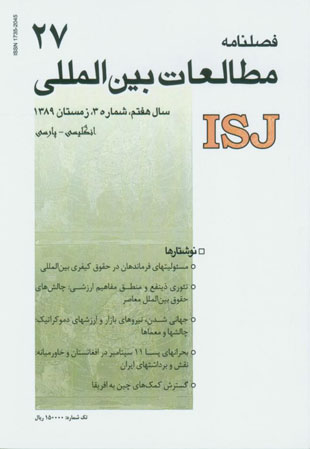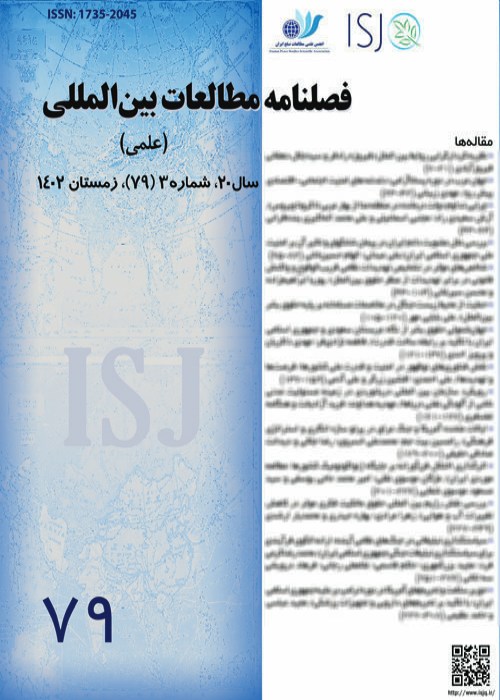فهرست مطالب

نشریه مطالعات بین المللی
سال هفتم شماره 3 (پیاپی 27، زمستان 1389)
- 166 صفحه،
- تاریخ انتشار: 1389/10/01
- تعداد عناوین: 5
-
-
صفحه 1در این مقاله نویسنده به مسئولیتهای فرماندهان ارشد نظامی و انتظامی در حوزه حقوق کیفری بین المللی می پردازد. به طور ویژه، رعایت اخلاق و اصول آن در حوزه نظامی از جمله مسئولیت های فرماندهان و مقامات ارشد نظامی در هنگام به کارگیری زور در عملیات های نظامی است. از آنجا که از منظر حقوقی مسئولیت های فرماندهان نظامی و انتظامی در پیوند با اخلاق و نظام اخلاقی است، بنابر این، آنها باید به آنها همواره وفادار باشند. اینکه چگونه این امر می تواند امکان پذیر شود، نکته ای است که این مقاله با بهره گیری از رویه قضایی و در نظر داشتن قواعد حقوق کیفری بین المللی به تحلیل و بررسی آن می پردازد.
کلیدواژگان: مسئولیت فرماندهان، مسئولیت اخلاقی، نظامی، افسران -
صفحه 19از هنگامی که انتشارات ادوارد فریمن، مدیریت استراتژیک: رویکرد ذینفعان را در سال 1984 مطرح کرد این موضوع به امری معمول در حقوق بین الملل تبدیل شده است. در این مقاله، نویسندگان به بررسی کفایت به کارگیری نظریه ذینفع حقوقی به منظور پدید آوردن فرصتی برای حقوق بین الملل معاصر می نگرند. دستیابی به این هدف از طریق فراهم آوردن یکسری مفاهیم پیچیده و گوناگون امکان پذیر است. یکی از چالشها به کارگیری رویه قضایی در موضوع ذینفع است. یکی دیگر از نگرانی ها چالش این واقعیت است که در حالی که تنها نسخه آرمانگرا از نظریه ذینفعان سازگار با این هنجارها بر اساس حقوق بین الملل معاصر است، ولی چارچوبی برای حقوق مربوطه و وظایف مربوطه ارائه نشده است. این نیز صادق است که ارزش های مشترک بنیان گذاران حقوق، یعنی آنچه که نیاز دارد به عنوان انسانیت از آن یاد شود و می خواهد به عنوان مشتق شده از استقلال باشد. این کمبودها، تقابل با پارادایم های تنگاتنگی است که در نهایت از طریق مفهوم اخلاق منحصر به فرد به دست می آید. این امر، به عنوان یک حداقل، عدالت توزیعی و حقوق بشر محسوب می شود. توجه به این امر که فریمن لیست گروه های تروریستی را در کنار و همتراز با تمام ذینفعان حوزه های دیگر به کار می برد بنابراین به نوعی در تلاش برای مشروعیت حقوقی و سیاسی است.
کلیدواژگان: حقوق بین الملل، اخلاق، سازمان ملل، چالش ها، اصلاحات حقوقی -
صفحه 81فرآیند جهانی شدن مالی، تجاری، ارتباطات، اطلاعات، تکنولوژی و سیاستهای جهانی در برگیرنده چالشها و معماهای گوناگونی است.علاوه بر این، فرایندهای یاد شده در برگیرنده نتایج اجتناب ناپذیری هم است. برای کشورهای آسیایی بحران اقتصادی 1997 و در سالهای اخیر بحران 2008 یکی از نشانه های چنین فرآیندی است که نه یک منطقه خاص بلکه همه جهان را در بر می گیرد. وانگهی هزینه و فایده فرآیند جهانی شدن به طور برابر میان دولت –ملتها تقسیم نشده است و شماری از آنها به طرز ناشایسته ای در معرض آسیب بیشتر قرار دارند. این مقاله به معماها و چالش های اخلاقی جهانی شدن و آزادی گرایی می پردازد. در عین حال موضوع بازتاب اقتصاد بازار بر سیاست گزاری عمومی هم محل بررسی است. این مقاله در نتیجه گیری خود پیشنهاد ارایه یک راهکار ساختاری ممکن نسبت به توزیع نامناسب هزینه ها و فایده های جهانی شدن را ارایه می دهد.
کلیدواژگان: جهان شدن، اخلاق، حقوق بشر، اقتصاد بازار، دموکراسی -
صفحه 111وضعیت پس از جنگ سرد و تغییرات ساختاری نظام بین الملل پس از 11 سپتامبر منجر به یک جانیه گرایی امریکا و به کار گیری قدرت مطلق از سوی این کشور شد. این امر به رویه ای در سیاست خارجی امریکا و نیز به یک ایدئولوژی برای نئوکان ها تبدیل شد که محور آن مبارزه با تروریسم و نیز حمایت از اسراییل بوده است. با این همه، اشغال افغانستان و سرنگونی صدام در عراق از سوی امریکایی ها به نفع ایران تمام شد و این کشور در ترتیبات منطقه ای به یک قدرت منطقه ای تبدیل شد. با این همه، سیاست ایران به یک سیاست مداراجویانه با غرب تبدیل نشد. این نوشتار با بهره گیری از تئوری نئورئالیسم به تحلیل برداشتها و نقش ایران در افغانستان و خاورمیانه به عنوان یک قدرت منطقه ای می پردازد.
کلیدواژگان: افغانستان، سیاست خارجی، پسا 11 سپتامبر، ایران، نئورئالیسم، خاورمیانه -
صفحه 131این مقاله به بررسی گسترش کمک های اقتصادی چین به افریقا می پردازد. به ویژه ماهیت و پویایی این کمک ها مورد بررسی نویسندگان قرار می گیرد. برای بررسی بهتر موضوع این مقاله، تحقیقات خود را از زمان جنگ سرد آغاز می کند. چین همواره کمک هایی را به قاره افریقا با مقاصد گوناگونی ارایه می کرده است. در این زمینه بهره مندی دولتهای افریقایی از این کمک ها برای توسعه و تاثیر آن بر روابط آنها با چین نکته اصلی و کانونی این پژوهش است. البته همه اینها از آنجا ناشی می شود که چین نفت و شماری از نیازهای خود را از چین تامین می کند. افزون بر این، چین منافع فراوانی نیز در سرمایه گذاری در افریقا، فروش اسلحه و صادرات کالا دارد. در نتیجه همه اینها، کمک های چین تاثیر فراوانی بر صحنه سیاسی افریقا، دموکراسی گرایی و ثبات در این قاره دارد.
کلیدواژگان: چین، سیاست، روابط خارجی، افریقا، مطالعات منطقه ای
-
Page 1This article examines a particular and underdeveloped aspect of superior responsibility in international criminal cases, namely that of the ethical boundaries of the military decision of commanders vis-à-vis the application of the use of force and military operations. Apart from the legal determination of superior responsibility of military commanders, this ethical dimension can interfere with the former determination. How and to what level, is to be assessed in this article, thereby relying on jurisprudence from various courts.
-
Page 19Since the publication of R. Edward Freeman’s Strategic Management: A Stakeholder Approach in 1984, applications of the stakeholder terminology, philosophy and methodology outside the context of business management have become commonplace. In this article, the two authors examine the adequacy of stakeholder theory for the purpose of making the leap from the original for-profit paradigm to contemporary international law, as set forth by the United Nations. The accomplishment of this objective is a piecemeal project – through systematic elaborations of complex concepts and issues. One challenge is to distill the essence of the general jurisprudence that matches the premises of, respectively, the narrow and broad stakeholder theory. Another challenge concerns the fact that while only the idealist version of the broad stakeholder theory is consistent with the norms under contemporary international law, the framework for the relevant rights and corresponding duties is not provided – but instead has to be added. This is also true of the values which are co-founders of rights, namely needs (as derived from humanity) and wants (as derived from autonomy). Remedying these deficiencies, the contrast with the narrow paradigm is ultimately through a concept of singular ethics that secures, as a minimum, rights-distributive justice. Given that Freeman lists terrorist groups on a par with all other stakeholder constituencies, the authors also endeavor to sketch the margins for legal and political legitimacy.
-
Page 81The process of globalization of finance, trade, communications, information technology, and world politics contains both challenges and dilemmas. Furthermore, the process is riddled with unintended consequences. From Asian currency crisis (1997) to the current economic downturn (2008-present), the fear that the market collapse could suddenly become global has become a reality and the need for an early-warning system for deteriorating national finances has become an imperative. The costs and benefits of globalization are not equally distributed among and within nation-states, as the most vulnerable are likely to suffer unjustly. Some unconscionable human costs will accrue to those most vulnerable and least able to adjust to such changes. The world is headed for a period of de-globalization, facing increased international tensions, conflicts, and nationalist fervor. The competition between great powers—specifically the United States and China—will surely dominate the political scene in the twenty-first century, and governments will aggressively intervene in their national economies as state power grows. Many observers have appealed to a rights-based approach to poverty reduction in the context of global justice, suggesting that the best way to tackle poverty is by defining it in terms of human rights entitlements. This paper addresses the ethical dilemmas of globalization and liberalization by first examining the extent to which globalization jeopardizes the social ethics of protecting the most underprivileged, and then by focusing on the varied consequences of globalization. The significance of this project lies in its ability to demonstrate the perils of subjugating public policy to the market economy. This paper concludes by suggesting possible structural solutions to the mal-distribution of benefits and costs of globalization.
-
Page 111In the Post-Cold War era structural change in the aftermath of 9/11 resulted in American “unilateral interventionism” with an unprecedented show of power. This is based on American foreign policy agenda being, initially directed by the neocons ideology, to deal frontally with issues like nuclear proliferation international terrorism, possession of oil wealth and protection of the state of Israel. However, the US invasion of Afghanistan 2001 and Iraq 2003 led to a rearrangement of regional policies in favour of Iran. The indisputable influence in Post-Taliban Afghanistan as well as Post-Saddam Iraq and having a strategic partnership with Syria, a central presence in Lebanon through Hezbollah have made Iran the most powerful actor in the region for the foreseeable future. This however, does not mean an inflexible Iranian position on key issues. A shift has occurred in Iran’s foreign policy which is based on careful pragmatic consideration of its agenda. The central argument of this study is based on the empirical assumptions of neo-realism and the need to find a solution as Frances Fukuyama puts it “After the neocons”. To analyse the perception and role of Iran, and US we have taken insights from theories of neorealism and techniques of foreign policy analysis. The study is focused on the role of incipient political entities.
-
Page 131The article examines China’s development aid to Africa. Specifically, it probes the nature and dynamics of Chinese aid, and its ramifications for Africa. In order to address the research problem, the article provides a historical account of China’s engagement in Africa dating back to the “Cold War era.” The central finding is that although African states derive some benefits from China’s development aid, the relationship is an unequal one. This is because, on balance, China is getting more from Africa in terms of oil and other raw materials, and profits from investments, trade and the sale of weapons, compared to the infrastructural projects and cheap manufactured goods that African states are getting. As well, Chinese aid has adverse impact on political democratization and stability on the continent, because it is being used to prop up repressive regimes and to help fuel conflicts.


